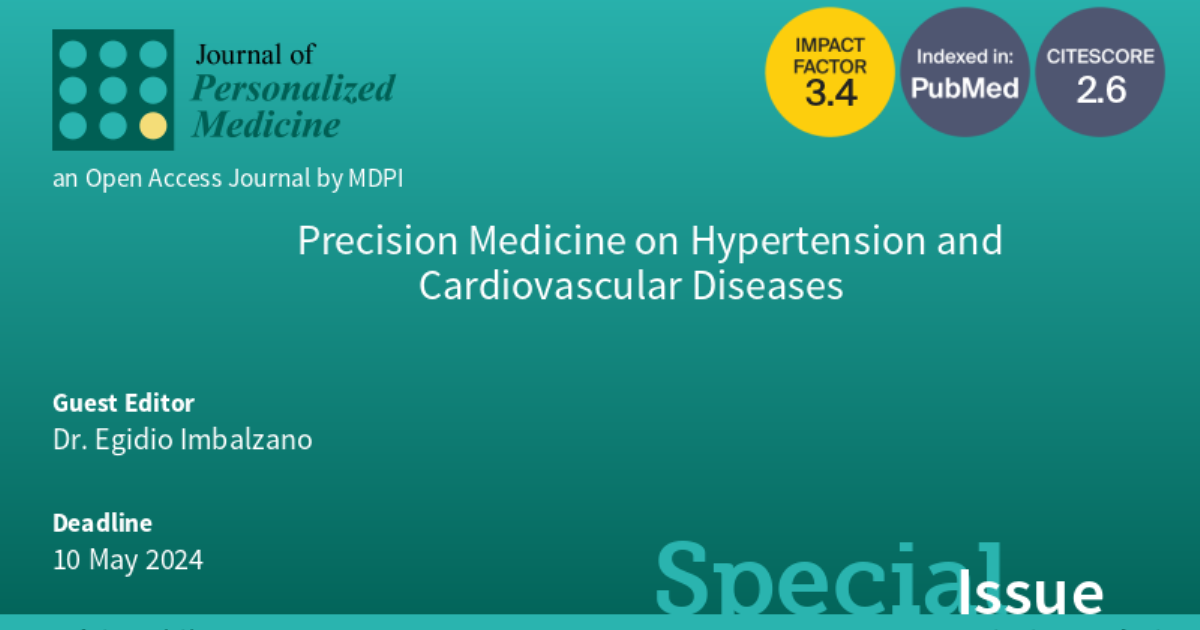- 6.0CiteScore
- 22 daysTime to First Decision
Precision Medicine on Hypertension and Cardiovascular Diseases
Special Issue Information
Dear Colleagues,
The personalization of pharmacological therapy for patients with cardiovascular disease represents one of the most interesting challenges of modern cardiology.
Precision medicine intends to focus on relevant topics of daily clinical practice such as arterial hypertension, diabetes, heart failure, hypercholesterolemia, and atherosclerotic cardiovascular disease (ASCVD).
In the field of therapy optimization and personalization, scientific research has introduced interesting innovations, and many others are underway (for example, SGLT2, PCSK9i, siRNA, antisense oligonucleotide).
Small-interfering RNA (siRNA) and antisense oligonucleotide (ASO) therapies hold great promise in the treatment of hypertension and various cardiovascular diseases, including coronary artery disease, myocardial infarction, heart failure, and arrhythmia, which remain leading causes of morbidity and mortality worldwide.
Specifically modulating key factors may offer potential breakthroughs in preventing or slowing disease progression.
These novel therapies have the potential to enhance drug delivery, reduce off-target effects, and provide prolonged therapeutic effects, improving patient outcomes. By targeting the root causes of cardiovascular diseases at the molecular level, these innovative therapies offer the hope for improving patient outcomes and reducing the global burden of cardiovascular morbidity and mortality.
These important innovations need to be discussed, shared, and analyzed both in terms of their adequacy and economic sustainability.
In this Special Issue, we welcome your submission of reviews, communications, and original research articles targeting any of these topics.
Dr. Egidio Imbalzano
Guest Editor
Manuscript Submission Information
Manuscripts should be submitted online at www.mdpi.com by registering and logging in to this website. Once you are registered, click here to go to the submission form. Manuscripts can be submitted until the deadline. All submissions that pass pre-check are peer-reviewed. Accepted papers will be published continuously in the journal (as soon as accepted) and will be listed together on the special issue website. Research articles, review articles as well as short communications are invited. For planned papers, a title and short abstract (about 100 words) can be sent to the Editorial Office for announcement on this website.
Submitted manuscripts should not have been published previously, nor be under consideration for publication elsewhere (except conference proceedings papers). All manuscripts are thoroughly refereed through a single-blind peer-review process. A guide for authors and other relevant information for submission of manuscripts is available on the Instructions for Authors page. Journal of Personalized Medicine is an international peer-reviewed open access monthly journal published by MDPI.
Please visit the Instructions for Authors page before submitting a manuscript. The Article Processing Charge (APC) for publication in this open access journal is 2600 CHF (Swiss Francs). Submitted papers should be well formatted and use good English. Authors may use MDPI's English editing service prior to publication or during author revisions.
Keywords
- proprotein convertase subtilisin/kexin type 9 inhibitors
- antisense oligonucleotides
- small-interfering RNA
- arterial hypertension
- hypercholesterolemia
- heart failure
- cardiovascular disease

Benefits of Publishing in a Special Issue
- Ease of navigation: Grouping papers by topic helps scholars navigate broad scope journals more efficiently.
- Greater discoverability: Special Issues support the reach and impact of scientific research. Articles in Special Issues are more discoverable and cited more frequently.
- Expansion of research network: Special Issues facilitate connections among authors, fostering scientific collaborations.
- External promotion: Articles in Special Issues are often promoted through the journal's social media, increasing their visibility.
- e-Book format: Special Issues with more than 10 articles can be published as dedicated e-books, ensuring wide and rapid dissemination.

